学而思七年级新目标英语之难点语法突破(三)
新目标七年级Unit 3 析难

新目标七年级Unit 3 析难1. these / those, 指示代词this / that 的复数形式,意思是“这些,那些”。
上单元我们已经学过了this / that, these / those与this / that的用法差不多。
(1) 它们表达复数概念;(2) these是就近指代,而those是相对的远处指代,当然这也只是一个相对概念,并不是绝对的;(3) 这对指示代词也经常单独行动,即它们从不和冠词(a, an, the)、形容词性物主代词(herm his, its, my等)连用;(4) 它们的一般疑问句在回答时不直接用these, those, 而是用they来代替上文的指示代词,以避免使用中的词汇重复;(5) 它们还可以放在名词前面,直接作为定语,但只与复数名词在一起使用。
—Excuse me, are these your apples?打扰一下,这些是你的苹果吗?—Yes, they are. / No, they aren’t.是,是的。
/不,不是。
I like those bananas. They look very nice.我喜欢那些香蕉,它们看起来很不错。
—Are those Betty’s grandparents?那是贝蒂的爷爷奶奶吗?—Yes, they are. And these are her parents.是啊,这是她的爸爸妈妈。
What’re those in the lost and found case?失物招领箱里的那些东西是什么?2. 道歉用sorry, “感谢;感激”说thank。
(1) thank 可作动词,其后常跟某人。
thank也可作名词,多用于复数,表示“感谢”。
Thank you (very much);Thank a lot. 非常感谢!Many thanks. 非常感谢!别人感谢你总得说句:You’re wele. /That’s all right. /It’s my pleasure. /With pleasure. 不用谢。
七上英语 Unit 4 单元语法突破(Grammar Focus-3c)

Ⅱ.动词填空
阅读下面短文,用括号内所给动词的适当形式填空(必要时可加情态动词或
助动词)。 Nancy 6. wor(kwsork) as a reporter.She has a lot of things 7.
(do)teovderoy day and sometimes works on the weekend. Last weekend she 8. wa(bse) busy as usual.On Saturday morning,
I like riding my bike.In the evening,I went shopping with my
parents and my little brother.My mom wanted to buy a pair
of shoes for me and pants( 裤 子 ) for my brother.I lWhen
you
your old friend?
—The day before yesterday.
A.will;visit B.do;visit
C.did;visit
D.did;visited
+Unit+3+单元语法知识突破+2023-2024学年人教版七年级英语下册+

人教版英语七年级下册第三单元语法知识突破人教版英语各个单元主要是围绕话题,展开语法,接下来,我们就以人教版英语七年级下册第三单元为例,给大家总结一下。
1、关于疑问词how.(1)、疑问词how可以用于询问对方的感受。
例如:How are you?你好吗?回答,I'm fine, thank you. 我很好,谢谢。
又如:How is your weekend? 你的周末过得怎样?回答:It is great.很好。
(2)、疑问词how还可以用于询问方式,例如:How do you get to school? 你怎样去上学?回答:I take a bus to school. 我乘坐公共汽车去上学。
又如:How do you learn English well?你怎样把英语学好?回答:I read it every morning.我每天早上都在读。
(3)、how还可以用于引导感叹句,例如:How beautiful a girl she is! 多么漂亮的女孩啊!2、关于交通方式的表达。
(1)、动词短语:take a\\an\ the+交通工具名称。
例如:take the train乘火车;take a bus 乘坐公共汽车;take the subway乘地铁。
表示“骑”用ride,例如:ride a bike骑自行车;ride a horse骑马。
drive表示“开车”,例如:drive a car。
表达“走路”,用“walk”。
(2)、介词短语:by+交通工具名称。
例如by train乘火车;by bus乘坐公共汽车;by subway 乘地铁;by plane,乘坐飞机;by bike骑自行车。
特别提醒:“走路”用on foot。
练习巩固:改为同义句。
I usually take the school bus to school. = I usually go to school ________ ________.My cousin Jim walks to school. = My cousin Jim goes to school _______ _________.His father drives his car to work. = His father goes to work ______ ________.参考答案:(1)、by bus (2)、on foot (3)、by car注意:表达交通方式的句型结构如下:(1)、主语+表示交通方式的动词短语+to + 地点;例如:I take the plane to Beijing.我乘坐飞机去北京。
英语七年级预备3单元语法重难点
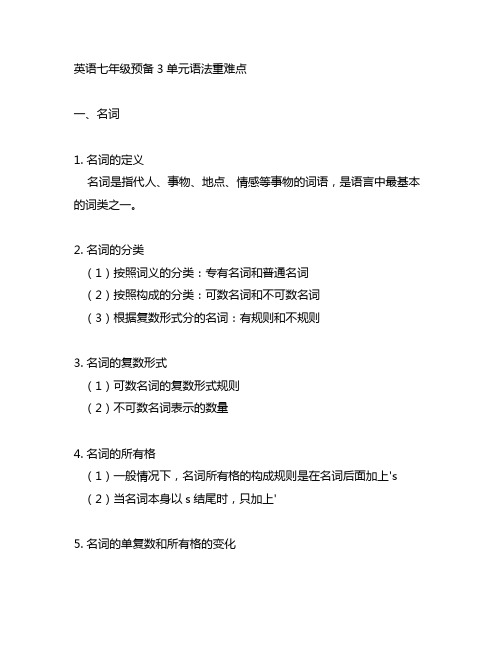
英语七年级预备3单元语法重难点一、名词1. 名词的定义名词是指代人、事物、地点、情感等事物的词语,是语言中最基本的词类之一。
2. 名词的分类(1)按照词义的分类:专有名词和普通名词(2)按照构成的分类:可数名词和不可数名词(3)根据复数形式分的名词:有规则和不规则3. 名词的复数形式(1)可数名词的复数形式规则(2)不可数名词表示的数量4. 名词的所有格(1)一般情况下,名词所有格的构成规则是在名词后面加上's (2)当名词本身以s结尾时,只加上'5. 名词的单复数和所有格的变化6. 名词性物主代词的用法名词性物主代词表示所有关系,通常具有名词和代词的特点。
二、动词1. 动词的定义动词是表示人或事物的动作、变化或状态的词语。
2. 动词的分类(1)按照词义的分类:行为动词、连系动词和助动词(2)根据构成方式分类:规则动词和不规则动词3. 动词的时态(1)一般现在时表示经常性动作或现阶段的状态(2)一般过去时表示过去某个时间内发生的动作或存在的状态4. 动词的用法(1)行为动词表示具体的动作或行为(2)连系动词表示主语的状态或性质(3)助动词用来帮助其他动词构成时态、语态、情态,或表示各种永固5. 动词的被动语态被动语态表示主语是动作的承受者。
6. 动词的一般现在时一般现在时表示经常性动作或现阶段的状态。
三、形容词1. 形容词的定义和功能形容词是用来描述名词性的词语,用来修饰和限定名词。
2. 形容词的用法形容词可以直接修饰名词,也可以与be动词连用。
3. 形容词的比较级和最高级形容词有原级、比较级和最高级三种形式。
用比较级表示两者之间的比较,用最高级表示三者或三者以上的比较。
四、代词1. 代词的定义和功能代词是用来代替、替代名词的词语。
2. 代词的分类(1)人称代词(2)物主代词(3)指示代词(4)疑问代词(5)不定代词五、时态1. 一般现在时2. 一般过去时3. 一般将来时4. 现在进行时5. 过去进行时6. 将来进行时7. 现在完成时8. 过去完成时9. 将来完成时总结回顾在本次的英语七年级预备3单元语法学习中,我们深入了解了名词、动词、形容词和代词的各种分类和用法。
初中英语语法突破

初中英语语法突破英语语法是英语学习的基础,对于初中生来说,掌握英语语法对于提高英语水平至关重要。
本文将详细介绍初中英语语法的重要知识点,帮助学生突破英语语法的难题。
第一章:名词1.1 名词的分类名词可以分为可数名词和不可数名词。
可数名词有单数和复数形式,不可数名词没有复数形式。
1.2 名词的所有格名词的所有格表示所属关系,通常在名词后面加上‘s 或者’。
1.3 名词的修饰语名词可以由形容词、代词和其他名词进行修饰。
•定语:The red car is fast.•定语从句:I saw a car which was red.第二章:代词2.1 代词的分类代词可以分为人称代词、物主代词、反身代词、指示代词、疑问代词和关系代词。
2.2 人称代词人称代词包括 I、you、he、she、it、we 和 they。
2.3 物主代词物主代词包括 my、your、his、her、its、our 和 their。
•物主代词:This is my book.•物主代词的修饰语:The book is mine.第三章:动词3.1 动词的分类动词可以分为实义动词、助动词和连系动词。
3.2 动词的时态动词的时态表示动作发生的时间,包括一般现在时、一般过去时、一般将来时、现在进行时、过去进行时和将来进行时。
3.3 动词的语态动词的语态表示主语与动作的关系,包括主动语态和被动语态。
•主动语态:I write a letter.•被动语态:A letter is written by me.第四章:形容词和副词4.1 形容词形容词用来修饰名词,表示事物的特征和性质。
4.2 副词副词用来修饰动词、形容词、副词和其他句子成分,表示程度、时间、地点等。
•形容词:The cat is cute.•副词:She sings beautifully.第五章:介词和连词5.1 介词介词用来表示时间、地点、方向和其他关系,通常放在名词或代词前面。
学而思七年级新目标英语之Unit3-4 基础提高与扩展2
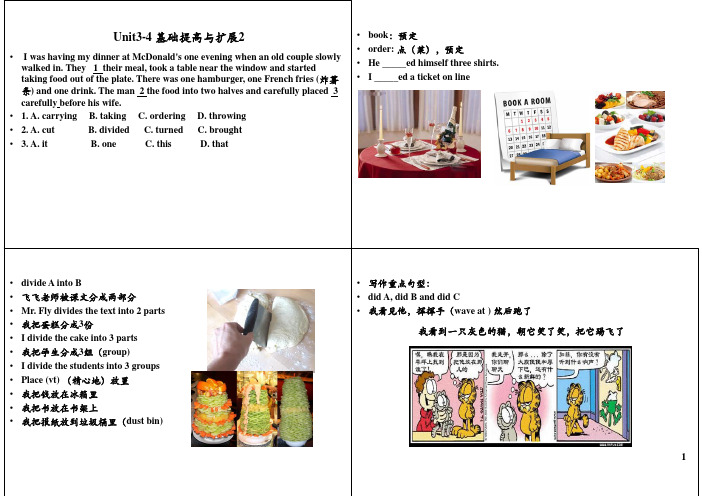
• 7. A. easy
B. different
C. hard
D. bad
• 8. A. happy
B. well
C. bad
D. pleased
• 9. A. angry
B. pleasant
C. sad
D. hungry
• So never 10 a chance to tell somebody you are sorry. Apologies can really change your life.
• Rise (v) 1.升起 • (v)2.起立, 起身; 起床 • 我今天起得早 • I rose early today • He rose to welcome me. • He put down his glass and rose to his feet . • He put down his glass and jumped to his feet .
我看到一只灰色的猫,朝它笑了笑,把它踢飞了
1
• He took a sip (一小口) of the drink. His wife also took one and then place the cup down between them. "That 4 old couple! All they can 5 is one meal for the two of them," thought I. As the man began to eat his French fries, I 6 to my feet, went over and said that I would like to buy another meal for them. But he _____me and said that they were happy to share everything.
初一年级英语语法难点突破技巧

初一年级英语语法难点突破技巧初一年级英语学习,就像是一场全新的冒险,特别是在语法这片领域。
许多学生在这个阶段面对英语语法难点时,可能会感到无从下手。
不过,掌握一些突破技巧可以让这场冒险变得更加顺利。
接下来,将揭示一些能够帮助学生克服初一年级英语语法难点的策略,让每一位学生都能在这场语言的探险中迈出坚定的步伐。
首先,理解基础概念至关重要。
在初一年级,学生开始接触到一些基础的语法规则,如时态、主谓一致、名词的单复数形式等。
这些基础概念是语法的“建筑基石”。
为了更好地理解这些概念,学生可以通过图表和例句来帮助自己建立清晰的概念。
例如,通过绘制简单的时态表来区分现在时、过去时和将来时,或者使用卡片记忆单复数形式,可以使这些概念更加直观易懂。
其次,实践是突破语法难点的关键。
语法规则的理解需要通过大量的练习来巩固。
定期完成练习题、做语法填空以及进行句子改错练习,都能有效提升对语法规则的掌握程度。
在练习中,学生可以通过标记出语法错误的方式来提高自己的敏感度,逐渐培养对语法规则的直觉。
同时,教师可以设计一些互动游戏和活动,让学生在轻松的氛围中进行语法练习,这种方式不仅能增强学习的趣味性,还能加深对语法知识的记忆。
此外,创造一个语法学习的环境也非常重要。
学生在学习英语时,应尽量多接触英语语境,例如通过阅读英文书籍、观看英文电影和听英文歌曲来提高自己的语言感觉。
在这些真实的语境中,学生可以看到语法规则的实际应用,从而加深对语法规则的理解。
例如,通过阅读英文文章来观察不同的时态使用,或者通过歌曲歌词来理解语法结构的运用,这些都能有效地帮助学生在实际语境中运用语法知识。
在学习过程中,设立小目标也是一种有效的策略。
学生可以将语法学习分解为若干个小目标,并为每个目标设定具体的学习计划。
例如,可以设定每天学习一个新的语法点,并进行相应的练习。
通过逐步实现这些小目标,学生不仅能够稳步提高自己的语法水平,还能够保持学习的积极性和动力。
学而思七年级新目标英语之Unit3-4 强化与精练

• 4. We decided to play on even though it was snowing.
• This passage gives some advice on how to be healthy. It talks about good habits and bad habits.
• This passage gives some advice on how to be healthy. It talks about good habits and bad habits.
• Early to bed, early to rise. Makes a man healthy, wealthy and wise. • This is an old English saying. It means that we must go to bed early and get
• Our bodies also need air to breathe(呼吸). Without air we die. Get up early in the morning and we can have plenty of clean, fresh air. That will keep us healthy and happy.
七年级英语下册 语法重点复习整理Unit 3 人教新目标版

七年级英语下册语法重点复习整理Unit 3 人教新目标版• tiger• elephant• koala• dolphin• pan da• lion• penguin• giraffe•…•Let’s see the lions first.• Why do you want to see the l ions?•Because they’re cute.(kind做名词:种类)• a ki nd of 一种• all kinds of 所有种类;各种各样• many kinds of 许多种类• different kinds of 不同种类• kind of = a little = a little bit 有点…• pretty = quite 相当…• so如此 too太 really真的 + 形容词adj.• be friendly to sb. = be kind to sb.• P andas a re my favorite animals.•= My favorite animals are pandas.•= My favorite animal is pandas.• pretty smart / kind of interesting• more than once 多于一次• Why not?• South Africa (Africa名 = African形)• What other animals do you like?• like to do sth.• play with sb.• eat grass(不可数)•She’s very shy, so please be quiet.• during the day = in the day• at night• eat leaves (leaf --- leaves knife --- knives)• He usually sleeps and relaxe s 20 hours every day. (relax --- relaxes) • gi ve description of…• be afraid of sb. / sth. / doing sth. 害怕…• He is twelve years old.• He is a twelve-year-old boy.• an eight-year-old girl• an eighteen-month-old baby•Isn’t it beautiful? Yes, it is. / No, it isn’t.•Isn’t he cute? Yes, he is. / No, he isn’t.•Aren’t you a student?Yes, I am. / No, I’m not.。
七年级英语语法难点突破单选题60题答案解析版
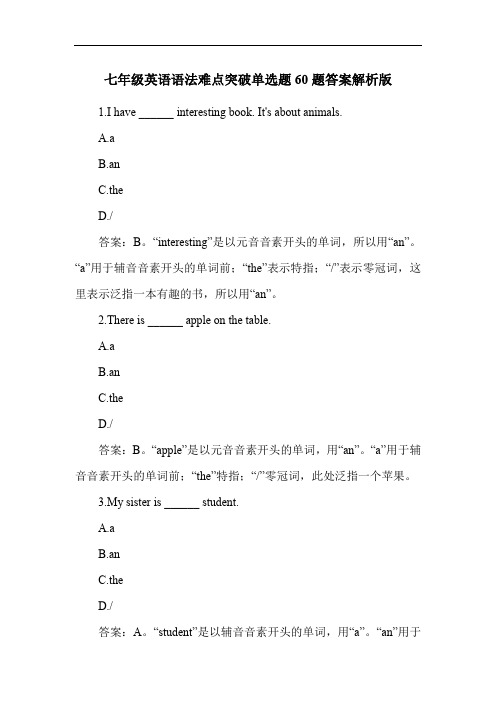
七年级英语语法难点突破单选题60题答案解析版1.I have ______ interesting book. It's about animals.A.aB.anC.theD./答案:B。
“interesting”是以元音音素开头的单词,所以用“an”。
“a”用于辅音音素开头的单词前;“the”表示特指;“/”表示零冠词,这里表示泛指一本有趣的书,所以用“an”。
2.There is ______ apple on the table.A.aB.anC.theD./答案:B。
“apple”是以元音音素开头的单词,用“an”。
“a”用于辅音音素开头的单词前;“the”特指;“/”零冠词,此处泛指一个苹果。
3.My sister is ______ student.A.aB.anC.theD./答案:A。
“student”是以辅音音素开头的单词,用“a”。
“an”用于元音音素开头的单词前;“the”特指;“/”零冠词,这里表示泛指一名学生。
4.This is ______ map. It's on the wall.A.aB.anC.theD./答案:A。
“map”是以辅音音素开头的单词,用“a”。
“an”用于元音音素开头的单词前;“the”特指;“/”零冠词,这里表示泛指一张地图。
5.I have ______ pen and two pencils.A.aB.anC.theD./答案:A。
“pen”是以辅音音素开头的单词,用“a”。
“an”用于元音音素开头的单词前;“the”特指;“/”零冠词,这里表示泛指一支钢笔。
6.There are many ______ in the park.A.treeB.treesC.a treeD.an tree答案:B。
“many”修饰可数名词复数,“tree”的复数是“trees”。
“atree”和“an tree”都是单数形式。
7.My father is a teacher. He teaches ______ English.A.weC.ourD.ours答案:B。
学考优化指导英语(人教七年级下单元语法突破3

(4)how many意为“多少”,询问可数名词的数量。 How many students are there in your class? 你们班有多少学生? (5)how much意为“多少”,询问价格或不可数名词的数量。 How much is the bag?这个包多少钱? How much milk do you want?你想要多少牛奶?
单元语法突破
how引导的特殊疑问句 (1)直接由how引导的特殊疑问句。 ①询问身体健康等情况。 How are your parents?你父母身体好吗? ②询问方法、手段。
—How do you study English? ——你怎样学习英语? —By speaking English every day. ——通过每天说英语。 ③询问天气状况。 How is the weather today?今天天气怎么样? ④询问程度。
How do you like this book? 你觉得这本书怎么样?
2
(2)由“how+形容词/副词”引导的特殊疑问句。 ①how long意为“多久;多长”,询问时间或物体的长度。 How long does it take you to get to work? 你花多长时间去上班? How long is the ruler?这把尺子有多长? ②how far意为“多远”,询问距离。 How far is it from your home to the station? 从你家到车站有多远? (3)how old意为“多大”,询问年龄。 How oldБайду номын сангаасis your grandfather? 你爷爷多大年纪?
4
初一英语语法突破讲义(总结)
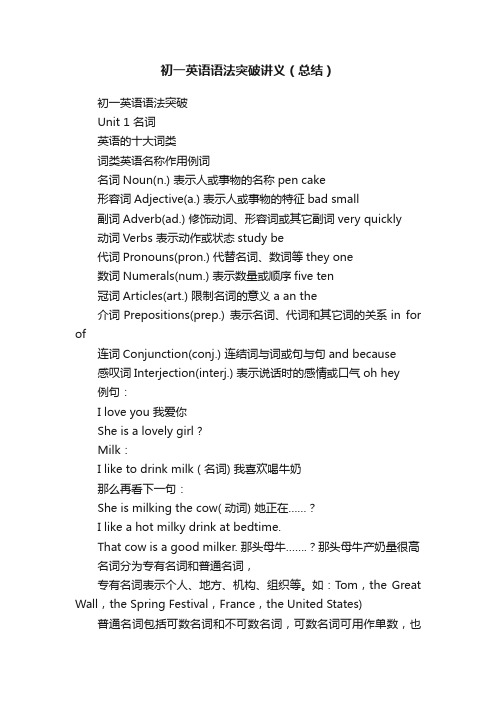
初一英语语法突破讲义(总结)初一英语语法突破Unit 1 名词英语的十大词类词类英语名称作用例词名词Noun(n.) 表示人或事物的名称pen cake形容词Adjective(a.) 表示人或事物的特征bad small副词Adverb(ad.) 修饰动词、形容词或其它副词very quickly动词Verbs 表示动作或状态study be代词Pronouns(pron.) 代替名词、数词等they one数词Numerals(num.) 表示数量或顺序five ten冠词Articles(art.) 限制名词的意义 a an the介词Prepositions(prep.) 表示名词、代词和其它词的关系in for of连词Conjunction(conj.) 连结词与词或句与句and because感叹词Interjection(interj.) 表示说话时的感情或口气oh hey例句:I love you 我爱你She is a lovely girl ?Milk:I like to drink milk ( 名词) 我喜欢喝牛奶那么再看下一句:She is milking the cow( 动词) 她正在……?I like a hot milky drink at bedtime.That cow is a good milker. 那头母牛…….?那头母牛产奶量很高名词分为专有名词和普通名词,专有名词表示个人、地方、机构、组织等。
如:Tom,the Great Wall,the Spring Festival,France,the United States) 普通名词包括可数名词和不可数名词,可数名词可用作单数,也可用作复数。
可数名词包括个体名词(表示一类人或物的个体。
如:boy,desk,cat,window)和集体名词(由若干个体组成的集合体。
如:family,class,police)。
人教版英语七年级上册Unit3 难点透视:Unit3 语法专项突破
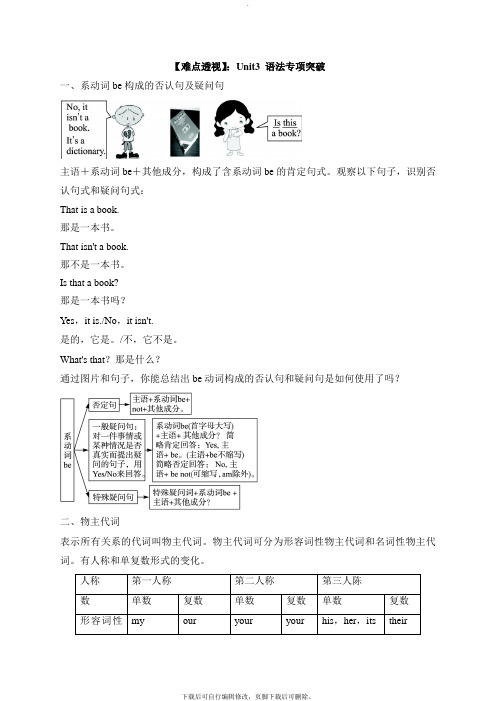
【难点透视】:Unit3 语法专项突破一、系动词be构成的否认句及疑问句主语+系动词be+其他成分,构成了含系动词be的肯定句式。
观察以下句子,识别否认句式和疑问句式:That is a book.那是一本书。
That isn't a book.那不是一本书。
Is that a book?那是一本书吗?Yes,it is./No,it isn't.是的,它是。
/不,它不是。
What's that?那是什么?通过图片和句子,你能总结出be动词构成的否认句和疑问句是如何使用了吗?二、物主代词表示所有关系的代词叫物主代词。
物主代词可分为形容词性物主代词和名词性物主代词。
有人称和单复数形式的变化。
1.You must do your work well.你必须把你的工作做好。
(your 作定语)We must do our homework well.我们必须把我们的作业做好。
(our作定语)2.名词性物主代词在句中作主语、宾语、表语等,相当于一个名词。
Mine is on the desk.我的在课桌上。
(mine作主语)Don't take hers away.不要把她的带走。
(hers 作宾语)It's his.那是他的。
(his作表语)Those books are theirs.那些书是他们的。
(theirs作表语)顺口溜帮你记:妈爱(my)变妈恩(mine),s结尾的不变化;以r结尾加s,形作定语他词伴;名表主宾须独行。
【例1】—Are you a student?—Yes,______.A.I'm B.I'm notC.I am D.I am not1.This is my jacket.(改为一般疑问句)______ ______ ______ ______?2.Is this a ruler?(作肯定答复)______,______ ______.3.Are you a teacher?(作否认答复) ______,______ ______.解析1.包含be动词的陈述句变为一般疑问句时,分三步:一提,即要把be动词提到主语前;二改,即当句子有第一人称的人称代词或物主代词时,要改成对应的第二人称;三变,即把句末的实点变成问号。
七年级(下)Units 3-4重难点详解word资料9页
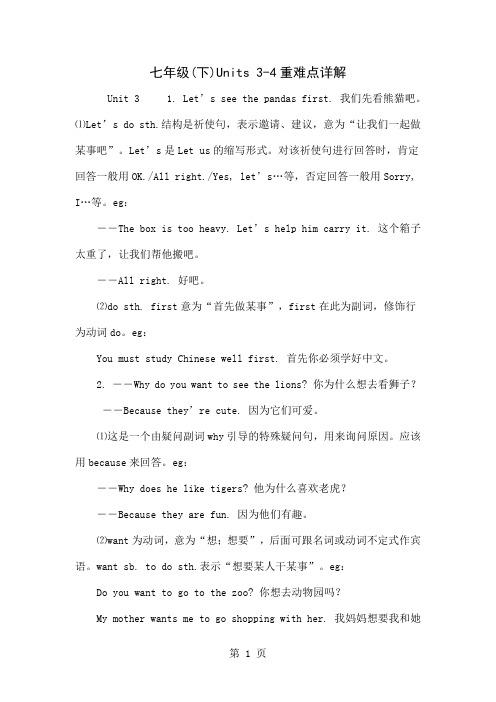
七年级(下)Units 3-4重难点详解Unit 3 1. Let’s see the pandas first. 我们先看熊猫吧。
⑴Let’s do sth.结构是祈使句,表示邀请、建议,意为“让我们一起做某事吧”。
Let’s是Let us的缩写形式。
对该祈使句进行回答时,肯定回答一般用OK./All right./Yes, let’s…等,否定回答一般用Sorry, I…等。
eg:――The box is too heavy. Let’s help him carry it.这个箱子太重了,让我们帮他搬吧。
――All right. 好吧。
⑵do sth. first意为“首先做某事”,first在此为副词,修饰行为动词do。
eg:You must study Chinese well first. 首先你必须学好中文。
2. ――Why do you want to see the lions? 你为什么想去看狮子?――Because they’re cute. 因为它们可爱。
⑴这是一个由疑问副词why引导的特殊疑问句,用来询问原因。
应该用because来回答。
eg:――Why does he like tigers? 他为什么喜欢老虎?――Because they are fun. 因为他们有趣。
⑵want为动词,意为“想;想要”,后面可跟名词或动词不定式作宾语。
want sb. to do sth.表示“想要某人干某事”。
eg:Do you want to go to the zoo? 你想去动物园吗?My mother wants me to go shopping with her. 我妈妈想要我和她一起去购物。
3. Do you like giraffes? 你喜欢长颈鹿吗?⑴这是一个一般现在时的一般疑问句形式,用来询问对方的观点。
主语是you,所以用助动词do;若主语是第三人称单数,则用助动词does。
学而思七年级新目标英语之语言能力提升——语法快车
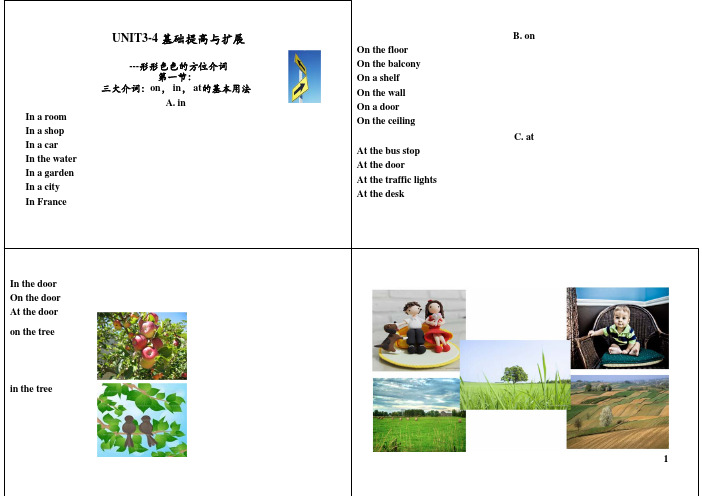
The girl is _____ hospital The woman is _____ a party My father is _____ a plane My mother is _____ a wedding (婚礼) I am watching TV _____ the bed
• On • Over • Above
“Where is Tom” “ He is in bed”
Newspaper Magazine Novel
Car Taxi Bus Ship Train Plane
in or on? Map Menu page
in/on?
East South West North Middle Left Right Top Bottom
Over I fall over I jump over the wall Around/round The earth goes around the sun I turn around and drive back My house is around the corner
off: The town is still five miles off. I must be off He is off line
第三节: 其它常见地点介词学习
3
The cat is _____ a table The plane is flying _____ the clouds The stars are _____ the crowd The boy is _____ the sand
across, through, past: The zombies are walking slowly _____ the field The people are swimming _____ the river
七年级英语上册单元语法突破3课件新版人教新目标版

一、含有be动词的一般疑问句 定义:一般疑问句是在句子中用提问的方式提供一些信息,要求 对方用Yes或No来回答的疑问句。 分类:一般疑问句有两种,一种是由be动词引导的疑问句,另一种 是由助动词或情态动词引导的疑问句,本单元主要讲前一种。其结 构请看下表:
结构 Be 动词(Is,Am,Are)+主语+其他?
编后语
有的同学听课时容易走神,常常听着听着心思就不知道溜到哪里去了;有的学生,虽然留心听讲,却常常“跟不上步伐”,思维落后在老师的讲解后。这两种情况都 不能达到理想的听课效果。听课最重要的是紧跟老师的思路,否则,教师讲得再好,新知识也无法接受。如何跟上老师饭思路呢?以下的听课方法值得同学们学习:
一、“超前思考,比较听课”
什么叫“超前思考,比较听课”?简单地说,就是同学们在上课的时候不仅要跟着老师的思路走,还要力争走在老师思路的前面,用自己的思路和老师的思路进行 对比,从而发现不同之处,优化思维。
比如在讲《林冲棒打洪教头》一文,老师会提出一些问题,如林冲当时为什么要戴着枷锁?林冲、洪教头是什么关系?林冲为什么要棒打洪教头?••••••
尖子生好方法:听课时应该始终跟着老师的节奏,要善于抓住老师讲解中的关键词,构建自己的知识结构。利用老师讲课的间隙,猜想老师还会讲什么,会怎样讲, 怎样讲会更好,如果让我来讲,我会怎样讲。这种方法适合于听课容易分心的同学。
2019/7/14
精选最新中小学教学课件
4
thank
you!
2019/7/14
回答
肯定回答:Yes,主语(人称代词)+be 动词. 否定回答:No,主语(人称代词)+be 动词+not.
—Is that your book?那是你的书吗? —Yes,it is./No,it isn’t.是,它是。/不,它不是。 —Are you English?你是英国人吗? —Yes,I am./No,I’m not.是,我是。/不,我不是。
学而思七年级新目标英语之Unit3-4 基础提高与扩展1

wear-wore-worn
• I 've been working all night and I'm worn out.
• It was eight o’clock in the evening. I’d just arrived at Heathrow Airport with my family and we were worn out after the long flight. We were going toravelling to Dublin. Some friends of ours had told us to get a taxi to our hotel, so we went to look for one. The airport was very bright and modern, but as soon as we came out, we found ourselves in a dark place of car parks and bus stations. We couldn’t see taxis anywhere, so we asked someone to tell us the way, but he didn’t speak English. Suddenly a big, friendly-looking man came up to us and said, “Give me your cases. I’ll take them to the taxi stand for you.” I told him not to worry because our cases weren’t heavy, but he just picked up my wife’s case and told us to follow him. I told him to come back but he didn’t stop.
- 1、下载文档前请自行甄别文档内容的完整性,平台不提供额外的编辑、内容补充、找答案等附加服务。
- 2、"仅部分预览"的文档,不可在线预览部分如存在完整性等问题,可反馈申请退款(可完整预览的文档不适用该条件!)。
- 3、如文档侵犯您的权益,请联系客服反馈,我们会尽快为您处理(人工客服工作时间:9:00-18:30)。
What did he do? He painted a picture on the wall.
Did he play basketball yesterday afternoon? No, he didn’t play basketball. He played football.
1.Lucy did her homework at home.(改否定句)
Lucy ________ _______ her homework at home. 2.He found some meat in the fridge(冰箱).(变一般疑问句)
___________ he __________ ___________ meat in the fridge? 3.Frank read an interesting book about history. (一般疑问句)
—Were Wei Hua and Han Mei here just now﹖
Yes,
/ No,
( )1. My father______ill yesterday.
A.isn't
B. aren't C. wasn't D. weren't
( )2. ______your parents at home last week﹖
_______ Frank _______ an interesting book about history? 6.Thomas spent RMB 10 on this book. (否定句) Thomas______ _____RMB 10
on this book. 7.My family went to the beach last week. (划线提问)
2
(3)疑问句式巧 Was(Were) + 主语 +? 前天你在家吗?
Were you at home the day before yesterday﹖ 今天早上她迟到了吗?
Was she late this morning﹖ 肯定回答用“Yes, 主语+was/were.” 否定回答用“No,主语+wasn't/weren't.”
(1)形式巧 主语是单数时,谓语动词用was; 主语是第二人称或其他人称复数时,谓语动词用were。 我昨天早上在教室 I was in the classroom yesterday morning. 他上周二在上课 He was at school last Tuesday. 这个男孩刚才在图书馆
The boy was in the library just now.
(2)否定句结构巧 主语 + wasn't/ weren't
昨天我不在这儿。 I was not here yesterday.
上周日我父母不在家。 My parents were not at home last Sunday
This morning he ____ ____ ________ because his father
_____ _____ _____ . 6. 他在打扫教室的时候,发现地上有块表。
When he ______ the classroom, he ______ a watch on the ground
4
She ________ (stay) at home and _________(do) some cleaning.
1. 我过了一个忙碌但却刺激的周末。
I ____ ___ ____ _____ _____ weekend. 2. Jenny喜欢看书。昨晚她看了一本英语书。
Jenny likes ______ ____. She _____ an English book last night. 3. Emma每天都看电视。可是昨天他没有看。
_____the man cook breakfast this morning? Yes, he _____.
What _____the boy _____ after school yesterday ? He______________.
_____________after class yesterday? He ______basketball.
3
Fill in the blanks with the words given. 10.I _____ (lose)my watch last week. 11.-Where _____ you ______ (catch) the fish?
-I ________ (catch) it in the river near the house. 12. His parents ___________(not go) out for a walk after supper yesterday. 13. She _________ (not visit) her aunt last weekend.
A. Was; before B. Is; before
C. Was; after D. Is; after
( )5. —Who was on duty last Friday﹖
—______.
A. I am B. I was C. Yes, I was D. No, I wasn't
What did the man read last night? He _____newspapers.
A.Is
B. Was
C. Are
D. Were
( )3. The twins____in Dalian last year. They____here now.
A.are; were B. were; are C. was; are D. were; was
( )4. ______your father at work the day_____yesterday(前天)﹖
hope-- hoped
keep -sleep -sweep --
come -become --
kept slept swept came became
grow -- grew
know -- knew
throw -- threw
teach -- taught catch -- caught
Fill in the blanks with the words given. 1.Betty_________ (watch) TV last night. 2.The Greens usually ________(have) supper at 6:30. 3.The boys____________ (play) football on the playground now. 4.Lucy _____ (leave) the classroom half an hour ago. 5.Look! The farmers ____________ (plant) trees on the mountain. 6._____she _________(practice) her guitar yesterday? No, she _________. 7.They ________ (ride) a bike to school yesterday. 8. _____ she _____ (fall) down the tree just now? 9.She often _____ (do)her homework in the evening.
call-- called stay-- stayed stop-- stopped
skip-- skipped is-- was
are-- were go-- went do-- did see-- saw
have-- had get-- got say-- said
feel-- felt
study-- studied
be的一般过去时: (1)形式巧,单数was,复数were;
I cleaned my classroom ___________.
A with three hours
B three hours ago
C in three hours
D three hours before
(2)否定句结构巧,not紧跟was/were; (3)疑问句式巧,was/were向前跑。
________ ________ ________ family _______ last week?
、. 1
一般过去时的时间状语(即标志词) 1. yesterday或以其构成的短语:yesterday morning(afternoon, evening)等; 2. 由“last+一时间名词”构成的短语:last night, last year (winter, month, week)
等; 3. 由“时间段+ago”构成的短语:a moment ago, a short time ago, an hour ago
等; 4. 其它:just now; the other day; long before等
_____the man at home yesterday?
No, he _____at home. He _____in the classroom.
worry-- worried
tell -- told
sell -- sold
begin -sing --
sit -swim -give --
began sang sat swam gave
bring -- brought
